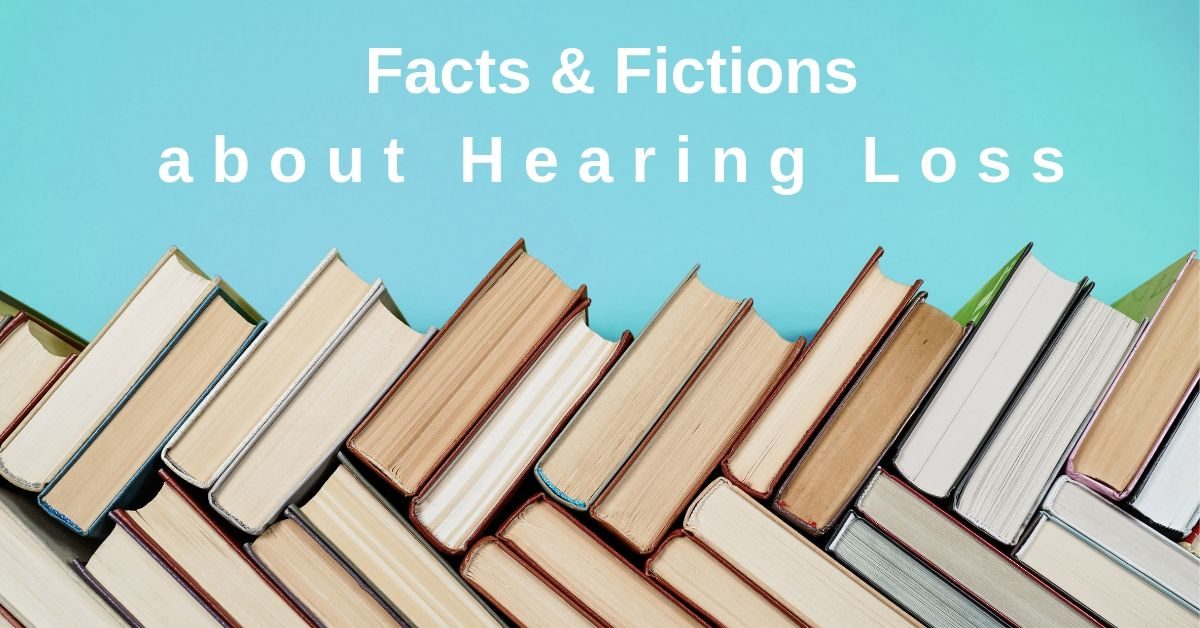Wearing hearing aids used to carry a very negative connotation, but these days with education and easy access to information and research, that is slowly changing. It is not uncommon to see most people walking around with earbuds at any given time, so wearing something like hearing aids should not be a big jump.
Hearing aids are more advanced and sophisticated than ever, and their aesthetics have significantly improved from the ones you might remember. This has led to a marked shift in our outdated perceptions of hearing aids as something to be hidden or ashamed of. The following will help inform you of some the misconceptions about hearing loss and hearing aids.
Fiction: Treating hearing loss can wait.
Fact: Unfortunately, it can’t. Damage to the ear disrupts the brain from receiving the proper signals and information to process sound. When this happens the neural pathways that are formed by the brain to recognise and translate sound remain unused. Over time, the inactivity results in the lack of recognition by the brain to translate sounds. When the auditory canal that transmits signals is either impaired, or not receiving the full spectrum of sound coupled with the inactivity of the pathways created by the brain, it results in hearing loss. If you take this all into account, you will realize that if you do wait too long and neglect your hearing loss it will be even harder for hearing aids to help you when you do decide to get them.
The good news is that with the proper assessment and diagnosis, the technologically advanced hearing aids available these days will help your brain to refresh and revise its ability to perceive and translate sound if they are worn as prescribed.
Fiction: Only older people experience hearing loss.
Fact: Aging is not the only factor in hearing loss by any means. Though it is true that age-related hearing loss is common, there is a rising number of young people at risk for developing hearing loss. Due to the prevalence of noise pollution at work and at home, misuse of personal audio devices, medications and a host of other reasons, hearing loss is now one of the top three public health concerns in the US. It has greatly impacted a younger and growing population. The National Institute on Deafness and Other Communicative Diseases (NICDC) has stated that “One in eight people in the United States (13 percent, or 30 million) aged 12 years or older has hearing loss in both ears, based on standard hearing examinations.”
Fiction: I’m healthy, so my hearing is fine.
Fact: While you might be healthy, hearing loss is an invisible condition that could affect anyone at any time. If left untreated, hearing loss could affect your overall health and well-being. The medical field has confirmed and researched a direct link of hearing loss to dementia, depression and isolation. Our bodies often find ways to compensate when our sense organs are not working to full capacity. In fact, many people wait 5 to 7 years before they even get a hearing assessment after they already know they are suffering from hearing decline.
The World Health Organization (WHO) states: “People with hearing loss benefit from early identification; use of hearing aids, cochlear implants and other assistive devices; captioning and sign language; and other forms of educational and social support.” If the use of hearing aids is detected early enough, with a proper fitting and treatment plan it can help to curb memory loss. In addition, a study from the Washington University School of Medicine in St. Louis, MO, hearing aids can be extremely beneficial on sustaining our sense of balance and safety!
Fiction: I’ll just turn up the volume.
Fact: If only it were that simple! Our ears are extremely complex organs and so are the processes that allow us to hear. When we listen, our brains translate signals received by the ear and we have the ability to focus on the sounds that are important, and to decipher speech from random sounds.
Once your hearing is damaged the brain doesn’t receive the full range of sounds healthy hearing is capable of. The distortion of sound and muffled speech only increases if turning up the volume is your solution. Hearing aids and other hearing devices use the best that technology has to offer to fit your specific hearing needs. They are geared towards filtering unwanted sounds and distinguishing background noise from speech for clarification.
Absolute Audio
At Absolute Audio, we look forward to supporting you if you have any questions, and to taking you to the next, best level of your hearing health. Make an appointment for yourself, or if you know someone close to you, that is ready to start nurturing the health of their hearing.

